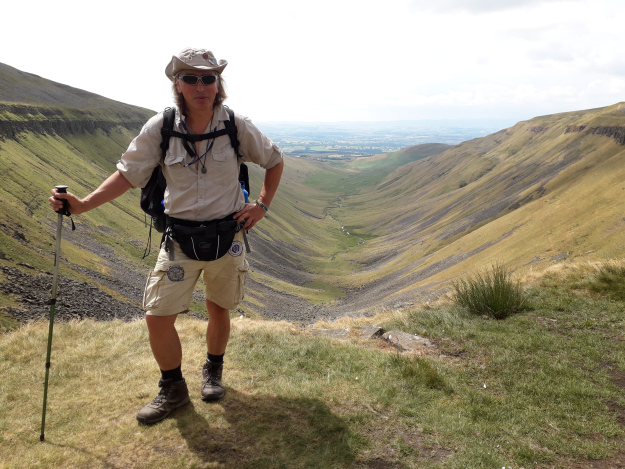From the diary of a “Viva Ninja”

Undertaking a PhD is a long-haul and to complete the 3–4 years of research, one of the key qualities you need is stamina: staying power, tenacity—call it what you like. As long as it gets the job done. I’ve honed my stamina by running and long-distance walking—because both of these require tremendous mental (as well as physical) stamina. Each summer I’ve walked a long-distance path, starting in 2014 with Hadrian’s Wall (84 miles) and increasing the distance each year – 2015: West Highland Way (96 miles); 2016: Offa’s Dyke (177 miles); 2017: Southern Upland Way (212 miles); and this year, the Pennine Way (255 miles).
Even though these are my vacations (designed for R&R!) and coming at the end of term, a form of ‘academic detox’ (post-exam marking period etc.), each time I’ve tried to push myself a little bit further. This last one in particular, falling as it did straight after I submitted my 80,000-word thesis (plus 75,000-word appendices) ended up being not just ‘the Great Escape’ (by that point, after months of intense effort, I really needed to cut loose) but also a kind of extended metaphor of the PhD journey.
This was not something I thought about a lot until the final day, but the trek did seem to neatly break down into my four-year experience, with each fifty miles representing a year and its landmarks: Year 1—research, 1st draft; Year 2—more research, 2nd draft; Year 3—consolidation of research, 3rd draft; Year 4—commentary and editing. But the ‘crunch’ time came, appropriately on the last day of my walk when I had to walk 26 miles, over 7 peaks, straddling the English-Scottish border, with a full forty-pound pack. I worked towards this (extending the daily distance, resting, planning, etc.), and by that point, I was ready to really push myself, as I didn’t have to hold anything back.
There were about a dozen of us roughly walking the whole route over the same 2–3-week period, but everyone else broke the last day, by either having the guest house pick them up and drop them back the next morning, or by staying over in one of the two mountain huts. But I decided to go for it. It is interesting to push oneself now and then, to see what you can accomplish, and to see how you can cope. What was really resonant about this last day—I saw it as a micro-metaphor for the viva. By Byrness, the penultimate stop on the way, it really feels liked you’ve pretty much nailed the walk—a bit like the feeling of submission—but oh no, the big push is yet to come.
I awoke at 4 am in my tiny bivvy-shelter and was on my way by 5 am. I saw the sunrise as I breached the brow of Byrness Knowe; and by 9 am I had reached Ravens Knowe—which had spectacular views over the Scottish Borders. Riding on adrenaline I pushed myself to reach the summit (highest point of the walk) by 11 am—13 miles; I had broken the back of the walk, and uncannily at the very moment I reached Windy Ridge, I received an email notification telling me my thesis had been sent to the examiners (the Doctoral College take a while to process things, and it was huge relief to know it had been sent off). Reaching that summit felt like the day of the viva itself—a massive effort to prepare for, to reach it; and then the almost vertiginous feeling of achieving it. I savoured the well-earned view as I ate my sandwiches and sipped some precious water. But then, critically, there was still an exhausting 12.5 miles to go, over several more peaks, with blistered feet and aching limbs—and this I saw as a sobering metaphor for revisions (minor or major).
It was a visceral, embodied way of preparing myself mentally for that extra effort. It is incautious to assume the viva will be the end: it may just be the ‘beginning of the end.’ That is the key thing to bear in mind. The viva is ‘Windy Ridge’ (13 miles in); not Kirk Yetholm (the end of the 250+ miles of the Pennine Way). That’s the critical difference. Basically, don’t peak too soon. Save something in reserve for that final effort, if it is required (to undertake major or minor revisions, etc.). Those last 12.5 miles were a real challenge as fatigue kicked in (cumulative, from 17 days of serious hiking), the temperature increased, water ran low, and blisters got worse. But I did it. Walking into Kirk Yetholm, to be greeted (unexpectedly) by the cheers of my fellow walkers sitting outside the Borders Hotel, was one of the most satisfying things I’ve ever done. I had accomplished what I had set out to do—by sheer determination and grit.
Thousands of people finish the Pennine Way every year (although only a fraction do it all in one go), and many achieve their doctorates too—but this was my accomplishment, my day. And it had taught me a valuable lesson about ‘keeping something in reserve’ for that post-viva final push, just in case it is needed. By succeeding in completing that epic last day, I felt encouraged that if it came down to it, I would be mentally prepared for whatever the examiners decide. They may say: ‘Congratulations! You have reached the finishing line!’ Or they may say: ‘You have passed! But… you have another three or six months of effort still to do!’ Of course there could be other outcomes too. But walking a long-distance route in extreme conditions (a heatwave in my case, with fires on the moors, etc.) inculcates resilience, and I will be ready.
Dr. Kevan Manwaring (@bardicacademic) is a Teaching Fellow in Creative Writing at the University of Leicester. This story was published on September 30, 2018, on Dr. Manwaring’s blog, The Bardic Academic (available here), and has been republished here with his permission.





